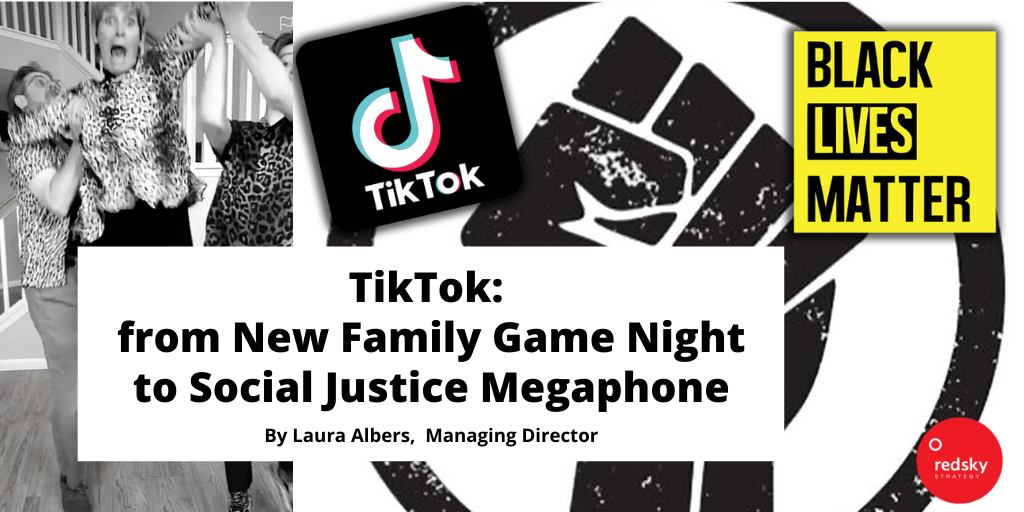News
TikTok – from New Family Game Night to Social Justice Megaphone

By Laura Albers Managing Director
More and more people across generations have swarmed to TikTok during COVID-19. No longer a place mostly for GenZ teens and 20-somethings, TikTok’s increased in popularity amongst older Millennials and Gen-Xers largely thanks to more concentrated time at home during this pandemic.
For the first time in our living memory, the world pushed pause. As folks were quarantining at home, looking for ways to entertain themselves or feel like they were “doing something,” they resorted to creative problem solving. “Family time” in particular took on new meaning thanks to the sudden and forced togetherness of families all day, everyday.
Parents were navigating working from home or looking for work (after joining the 51 million who have lost their jobs) along with the not so small task of serving as full-time teachers to their children. Everyone was looking for ways to alleviate the pressures of quarantine, to navigate the uncertainty of the highly transmissible and dangerous Coronavirus, and to make sense of the mixed messages about what steps they should be taking to protect themselves and others. Anxiety levels were at an all time high.
In search of relief, entertainment, and connection with the outside world, screen time, gaming, and social media usage surged. Young people were in close quarters with their parents and parents had more time with their children than ever before.
Family game night activities were back in business! Those board games of days gone by made an impressive comeback, selling out everywhere. Video gaming surged with cultural phenom, “Animal Crossing: New Horizon” breaking sales records for the Nintendo Switch, and other online games crossing the billion-dollar mark in March.
Kids, who were “Bored in the House” were using TikTok to prank their parents. Dads in particular, became the butt of many jokes, and the more authentic their reaction, the more love the video received. As a result, parents started becoming more interested in how to get in on this TikTok action.
In fact, here at RedSky Strategy our Covid-19 tracking study* shows that parents (19%), and dads specifically (21%), were using TikTok significantly more than non-parents (9%). Interestingly, the same parents who were playing video and board games (46%) were more likely to be using TikTok too (24%).
We saw families bonding together, having laughs and sharing good vibes. We watched them learn and fumble through TikTok dances. And now we’ve arrived at a moment where TikTok is rampant with fun, silly parent-generated content. As that shift has occurred, GenZ has found a way to evolve the platform once again. TikTok has become a place where GenZ social justice warriors flock to demonstrate their allyship for Black Americans and the Black Lives Matter movement and actively partake in political advocacy movements without having to leave the house.
This unprecedented moment of “Together Apart” has left the world in a reflective place and has left us with time to examine our moral fiber as a people. We have been given the time to truly reflect on what matters, what is essential, and who we will choose to be when we come out on the other side of this pandemic.
While TikTok is not going to resolve systemic racism for us or solve the everyday problems of being “Bored at the House,” it is an example of how we can evolve conversations and open dialogs across generations. While the platform itself is simple, its users have found ways to leverage the tool to suit their evolving needs. From parents looking for a release and a way to connect with their kids, to young social justice warriors looking for safe ways to make an impact, the app has proven malleable and useful to those creative enough to use it. That is the measure of any good media tool – its utility to the user. And as long as TikTok continues to be a useful tool, people will find new and creative ways to leverage it for whatever version of our world lies ahead of us.
*Methodology:
These findings are from the RedSky Strategy proprietary national survey that ran three times from March 30 through June 5 in order to better understand the impact of the COVID-19 pandemic.The survey results were comprised of a representative sample of the US population, including approximately equal amounts of women and men, spanning ages 18-65+. The survey aimed at uncovering people’s attitudes both during and about the pandemic by asking questions around self-assessed mental and physical health, consumer behaviors, attitudes, and more.
